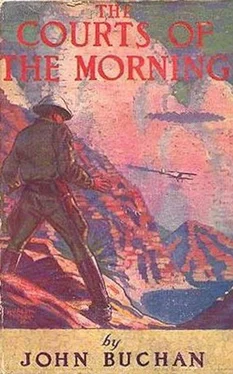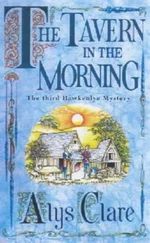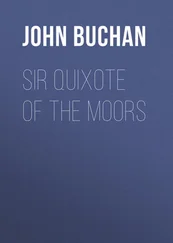John Buchan - The Courts of the Morning
Здесь есть возможность читать онлайн «John Buchan - The Courts of the Morning» — ознакомительный отрывок электронной книги совершенно бесплатно, а после прочтения отрывка купить полную версию. В некоторых случаях можно слушать аудио, скачать через торрент в формате fb2 и присутствует краткое содержание. Жанр: unrecognised, на английском языке. Описание произведения, (предисловие) а так же отзывы посетителей доступны на портале библиотеки ЛибКат.
- Название:The Courts of the Morning
- Автор:
- Жанр:
- Год:неизвестен
- ISBN:нет данных
- Рейтинг книги:3 / 5. Голосов: 1
-
Избранное:Добавить в избранное
- Отзывы:
-
Ваша оценка:
- 60
- 1
- 2
- 3
- 4
- 5
The Courts of the Morning: краткое содержание, описание и аннотация
Предлагаем к чтению аннотацию, описание, краткое содержание или предисловие (зависит от того, что написал сам автор книги «The Courts of the Morning»). Если вы не нашли необходимую информацию о книге — напишите в комментариях, мы постараемся отыскать её.
The Courts of the Morning — читать онлайн ознакомительный отрывок
Ниже представлен текст книги, разбитый по страницам. Система сохранения места последней прочитанной страницы, позволяет с удобством читать онлайн бесплатно книгу «The Courts of the Morning», без необходимости каждый раз заново искать на чём Вы остановились. Поставьте закладку, и сможете в любой момент перейти на страницу, на которой закончили чтение.
Интервал:
Закладка:
Chapter I
This story begins, so far as I am concerned, in the August of 192--, when I had for the second time a lease of the forest of Machray. Mary and Peter John and the household had gone north at the end of July, but I was detained for ten days in London over the business of a Rhodesian land company, of which I had recently become chairman. I was putting up at my club, and one morning I was rung up by Ellery Willis of the American Embassy, who had been wiring about me all over the country. He seemed to be in a hurry to see me, so I asked him to luncheon.
I had known Willis in the War, when he had had a field battery with the American 2nd Corps. After that he had been on the Headquarters Staff at Washington, and was now a military attaché at the London Embassy. He seemed to have a good many duties besides the study of military affairs, and when I met him he was always discoursing about world-politics and the need of England and America getting close to each other. I agreed with him about that, but used to tell him that the best way was not to talk too much, but to send Englishmen and Americans fishing together. He was an ardent, rather solemn young man, but with a quick sense of humour, and Mary said he was the best dancer in London.
He cut at once into business.
"You are a friend of Mr Blenkiron's--John S. Blenkiron," he said. "I want to know if you have heard from him lately?"
"Not for months," I said. "Blenkiron was never a regular correspondent, and the fount has dried up since last December."
He looked grave. "That's bad," he said.
"There's nothing wrong?" I asked anxiously.
"Only that nobody knows what has become of him."
"But that was always the old ruffian's way. He likes to cover his tracks, like Providence, and turn up suddenly when he is not expected. There's a lot of the child in him."
Willis shook his head. "I expect there's more to it this time than that. I'll tell you what we know. He made a dive back into Wall Street last fall, and did some big things in electrolytic zinc. Then he went to Santa Catalina, and returned to New York in the second week of January. On the 27th day of that month he sailed for Panama in a fruit-steamer, having previously shut up his office and wound up his affairs as if he were thinking of his decease. From that day no one has clapped eyes on him. He has nothing in the way of family life, but I needn't tell you that he has plenty of friends, and they are beginning to get anxious. All that we can find out is that last March a little Jew man turned up in New York with an order from Mr Blenkiron for a quarter of a million dollars. It was all right, and the money was handed over, and the shape it took was a draft on Valparaiso to be paid after countersignature by our consul there. We got in touch with the consul, and heard that the money had been collected on Mr Blenkiron's instructions by some fellow with a Spanish name."
"That sounds queer," I said.
"It certainly does. But there's something queerer still. In June Mr Neston of the Treasury got a letter--he had been a business associate of Mr Blenkiron's at one time and they used to go bass-fishing in Minnesota. It didn't come by mail, but was handed in one evening at Mr Neston's private residence. It bore no name, but there could be no doubt it was from Mr Blenkiron. I have seen a copy of it with Mr Neston's commentary, and I can tell you it was great stuff. The writer warned his old friend that there might be trouble brewing in certain parts of the world which he did not specify, and he begged him, as he was a good American, to keep his eyes skinned. He also said that he, the writer, might have to ask some day soon for help, and that he counted on getting it. The funny thing was that the letter was in a kind of cypher. I understand that Mr Blenkiron used to write to his friends in a high-coloured version of our national slang, and that he had a good many private expressions that were Choctaw to those that did not know him. That letter might have been read as the perfectly natural expression of a light-headed American, who had been having too many cocktails and was writing drivel about his health and his habits and the fine weather. But, knowing how to construe it, it made Mr Neston sit up and take notice.... There was another thing. I have said that the letter had no name, but it was signed all the same. It seems that in any very important and intimate communication Mr Blenkiron used to make a hieroglyphic of his surname and stick J. S. after it in brackets. That was meant to be a kind of S.O.S. to his friends that the thing was mighty important. Well, this letter had the hieroglyphic in three places, scrawled in as if the writer had been playing absent-mindedly with his pen. Mr Neston's conclusion was that Mr Blenkiron had written it in some place where he was not allowed to communicate freely, and might be in considerable danger."
I admitted that it looked like it, and said that if Blenkiron had been captured by bandits and held up to ransom, I could vouch for it, from what I knew of him, that his captors had done the worst day's work of their lives. I asked what his Government was doing about it.
"Nothing official," said Willis, "for we are in this difficulty. We are afraid of spoiling Mr Blenkiron's game, whatever it may be. Washington has a very high respect for his talents, and we should hate to cross him by being officious. All the same, we are anxious, and that is why I have come to you."
He proceeded to give me one of his lectures on international affairs. America, by his way of it, was in a delicate position, in spite of being rich enough to buy up the globe. She was trying to set her house in order, and it was a large-sized job, owing to the melting-pot not properly melting but leaving chunks of undigested matter. That was the real reason why she could not take a big hand in world-affairs--the League of Nations and so forth; she had too much to do at home, and wanted all her energies for it. That was the reason, too, why she was so set on prohibition of all kinds--drink, drugs, and aliens. But her hand might be forced, if anything went wrong in the American continent itself, because of her Monroe Doctrine. She didn't want any foreign complications at the moment. They would be very awkward for her, and possibly very dangerous, and she would resolutely keep out of them, unless they occurred, so to speak, opposite her front yard, in which case she would be bound to intervene. Therefore, if anyone wanted to do her the worst kind of turn, he would stir up trouble in some place like South America. Willis believed that Blenkiron had got on the track of something of the kind, and was trying to warn her.
That sounded reasonable enough, but what was not reasonable was Willis's straight request that I should put on my boots and go and look for him. "We can't do anything officially," he repeated. "An American would be suspected where an Englishman would get through. Besides, I believe you are his closest friend."
Of course I at once disabused him of that notion. I knew old Blenkiron too well to be nervous about him; he could no more be badly lost than Ulysses. I saw Willis's point about American politics, but they were no concern of mine. I told him in so many words that my travelling days were over, that I was a landowner and a married man and the father of a son, with all sorts of prior duties. But he was so downcast at my refusal, and so earnest that something should be done, that I promised to put the matter before Sandy Arbuthnot. I proposed in any case to go to Laverlaw for a couple of days on my way to Machray.
Chapter II
Laverlaw is a very good imitation of the end of the world. You alight at a wayside station in a Border valley, and drive for eight miles up a tributary glen between high green hills; then, when the stream has grown small and you think that the glen must stop, it suddenly opens into an upland paradise--an amphitheatre of turf and woodland which is the park, and in the heart of it an old stone castle. The keep was once a peel-tower, famous in a hundred ballads, and the house which had grown round dated mostly from the sixteenth century. I had never been there before, for the old Lord Clanroyden had lived sick and solitary for years, and Sandy had only succeeded in the previous February. When I arrived in the early gloaming, with that green cup swimming in amber light and the bell-heather on the high ground smouldering in the sunset, I had to rub my eyes to make sure that the place was not a dream. I thought it the right kind of home for Sandy, a fairy-tale fortress lying secret in the hills, from which he could descend to colour the prose of the world.
Читать дальшеИнтервал:
Закладка:
Похожие книги на «The Courts of the Morning»
Представляем Вашему вниманию похожие книги на «The Courts of the Morning» списком для выбора. Мы отобрали схожую по названию и смыслу литературу в надежде предоставить читателям больше вариантов отыскать новые, интересные, ещё непрочитанные произведения.
Обсуждение, отзывы о книге «The Courts of the Morning» и просто собственные мнения читателей. Оставьте ваши комментарии, напишите, что Вы думаете о произведении, его смысле или главных героях. Укажите что конкретно понравилось, а что нет, и почему Вы так считаете.












